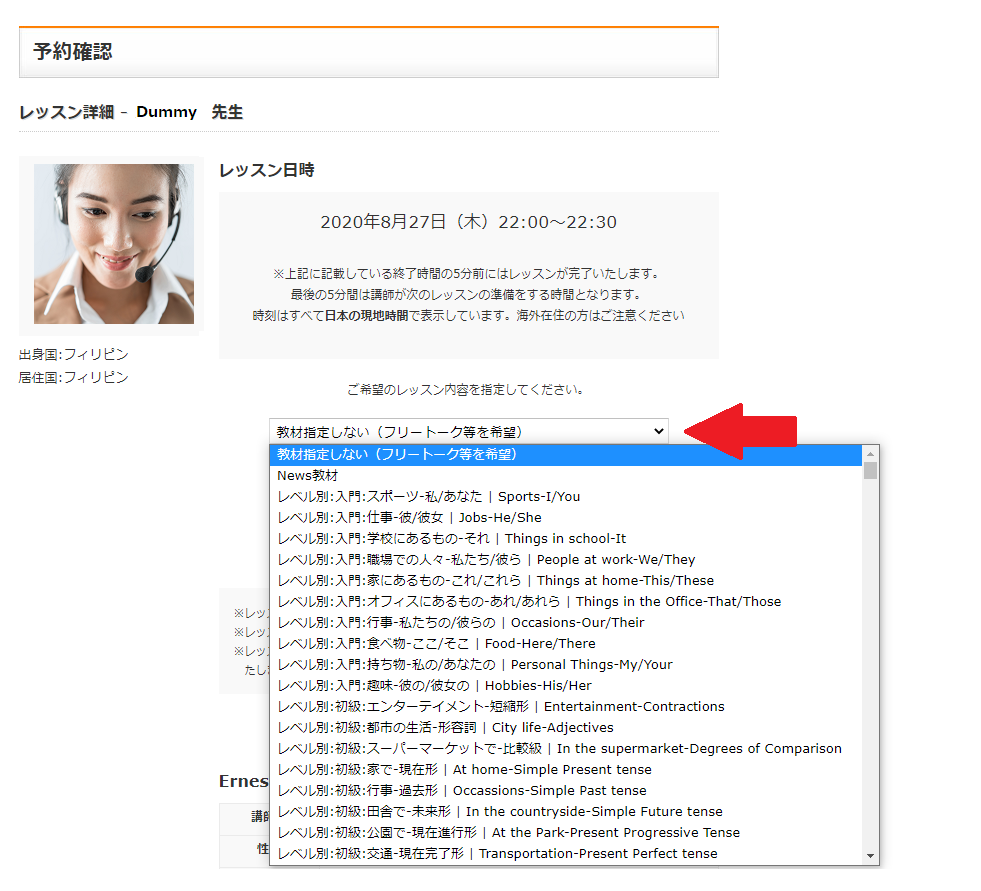お客様各位
平素はWeblio英会話をご利用いただき誠にありがとうございます。
レッスンで使用できる教材の選び方と、指定方法についてご案内です。
Weblio英会話では多数のオリジナル教材を取り扱っており、受講前に使いたい教材を指定していただくことができます。適切な教材を継続的にご利用いただくことで、より効果的に英会話を学習することができます。
予約時の教材の指定方法
教材は、レッスン予約時に指定することができます。予約確定ボタンを押す前に、以下の部分で教材を指定してください。
レッスン予約画面:

教材の選び方
レベルの目安と教材の説明を参考に、自分にあった教材を選択してください。
気になるトピックの教材を読み、一番興味があるもの、楽しそうなものをご利用ください。
・教材はレッスンの予約ごとに、毎回お選びいただけます。
・同じ教材を続けてご利用いただくことも、やりたいことや気分に合わせてフリートークや他の教材を選んでいただくこともできます。
・教材が自分に合っているかどうかは、実際にレッスンを受けてみて、判断しましょう。自分の目的とレベルに近いと感じたものをいくつか試してみて、自分に最も合った教材を見つけてください。
自分のレベルが分からない時
自分のあてはまるレベルが分からない時は、以下の基準を参考にレベルをお選びください。
| レベル | 目安の英語力 | TOEICの目安 |
|---|---|---|
| 1 | 基本的なあいさつや、単語を使った受け答えができる | 0-250 |
| 2 | 道案内など、基本的な質問のやりとりができる | 255-395 |
| 3 | 身近なもの、自分のよく知っているものについて、単語を使った簡単なやりとりができる | |
| 4 | 英語の指示に従うことができる、自分の生活やほしいものについて説明ができる | 400-655 |
| 5 | 旅行中の会話などのコミュニケーションをスムーズにとれる | |
| 6 | 好きなものに関して自分の意見を言うことができる、日常会話を楽しめる | |
| 7 | あるトピックに関して自分の意見を述べ、ディスカッションをすることができる | 660-990 |
| 8 | ネイティブとスムーズに会話ができ、臨機応変に口調やニュアンスを変えて会話できる |
教材の説明
Weblio英会話のオリジナル教材はそれぞれ、レッスン内容や伸びるスキルが異なります。目的ややりたいことに一番近いものをお選びください。
→教材の内容を詳しく見る
日常会話教材
会話練習やロールプレイ、ディスカッションを通して、スムーズな会話ができるコミュニケーションスキルを身につける教材です。
入門(レベル1)
会話文の音読、穴埋め問題などを通して、挨拶や自己紹介、日常会話に必須な表現が身につきます。
コミュニケーションをスムーズに行うことができるようになります。
初級(レベル2~3)
音読、会話練習、ロールプレイを通して、日常の会話で頻出する表現を学べます。
自分のことや普段の生活について話す力がつきます。
中級(レベル4~6)
単語の学習や会話音読、読解、ロールプレイを通して、日常で遭遇する話題について話す力を身につけます。
様々なトピックに関してのディスカッションや会話ができるようになります。
上級(レベル7~8)
単語や慣用表現の学習、会話文の要約、ロールプレイなどを通して、語彙力や表現力を身につけられます。
多様なトピックについて、自分の言葉で話せるようになります。
英文法(レベル1~4)
主要な英文法について、イラストの描写や会話練習を通して学ぶ教材です。
分からない文法や気になる文法についてピンポイントで学ぶことができ、会話などの実践を通すことで自然で正しい英文法を身につけることができます。
ビジネス英会話(レベル1~8)
ビジネスのシチュエーションに応じた語彙の学習や会話練習、ディスカッション、ロールプレイを通して、ビジネスシーンで実践的に使える英語を身につける教材です。
レベルやシチュエーションに応じて、必要なビジネス英語を使いこなせるようになります。
旅行英会話(レベル2~4)
旅行先でよく使う会話表現を学べる教材です。
「空港で入国審査をする」「レストランで要望を伝える」「ホテルでチェックインをする」などのシチュエーションを想定し、頻出する単語や表現の学習、講師との会話練習を通して、最適な英語表現を身につけられます。
カジュアルトーク(レベル1~8)
さまざまなテーマについて、15個の質問に答えながら講師を会話をする教材です。
フリートークに近いレッスンで、たくさん会話をすることで自然なやりとりが身につく教材です。
ニュース教材(レベル1~8)
最新のニュースに沿った単語学習、音読、読解、ディスカッションを通して、読解力や会話力などが身につきます。
日々最新のレッスンが追加されており、毎日受講されている方におすすめの教材です。
子供向け英会話(レベル0~1)
始めて英語に触れるお子様が、英語に親しんでいただける教材です。
ABCから始まり、基礎的な発音や簡単な短い文章を学ぶことができます。
発音(レベル0~8)
苦手な発音を集中的に学習できる教材です。
類似した発音を比較しながら学ぶことで、より自然な発音を身につけることができ、正確なリスニング力も鍛えられます。
TOEIC®対策(レベル2~5)
TOEIC®L&Rテストについて、練習問題を講師と一緒に解いていく教材です。
TOEICの問題に頻出する単語を身につけながら、読解問題の練習をすることができます。
TOEIC600点を目指している方におすすめです。
中高生向け外部試験対策(レベル2~8)
中学三年生レベルから大学上級レベルまでの、英語の外部検定試験のスピーキングテスト対策教材です。
口頭での試験について、実際の試験に近い形で、講師にフィードバックをもらいながら練習することができます。
絵の描写や、自分についての質問に答える練習ができます。
世界文学(レベル6~8)
有名な物語を使って、語彙力や読解力をつけられる教材です。
日本人にもなじみのある物語を読んで、内容について講師と話しながら、語彙力や表現力を身につけることができます。
教材選択方法の参考例
レッスンを効果的に受講するためには、自分の目的とレベルに合った教材を選ぶことが大切です。また、適切な教材を選ぶことは楽しい学習への手助けにもなります。
ここでは英会話を受講する目的別に、教材の選択例をご紹介いたします。
・とにかく英語で話してみたい
おすすめ教材:日常会話、カジュアルトーク
→様々なトピックについて、積極的に会話ができる教材です。英語での会話力や表現力が培われます。
・楽しく海外旅行ができるようになりたい
おすすめ教材:旅行英会話、日常会話
→日常会話で頻出の表現や、旅行先のシチュエーションごとの会話表現が学べます。
・海外の人とスムーズに意見交換できるようになりたい
おすすめ教材:コラムディスカッション、ニュース教材
→様々なトピックについて自分の意見を述べる練習をし、英語での意見交換に慣れましょう。自分の興味のあるトピックを選ぶようにしましょう。
・会話で自信をもって話せるようになりたい
おすすめ教材:英文法、発音、カジュアルトーク、ビジネス英会話
→英文法で自然で正しい英語で話す力を身につけましょう。発音が気になっている方は、発音教材で苦手な発音を克服しましょう。
カジュアルトークは、自分について話す機会が多いので、たくさん話して自信をつけましょう。
ビジネスシーンで英語を使う機会がある方は、ビジネス英会話教材もおすすめです。特定のシチュエーションで迷わず英語を話せるように練習することができます。
今後ともWeblio英会話をどうぞよろしくお願いいたします。

